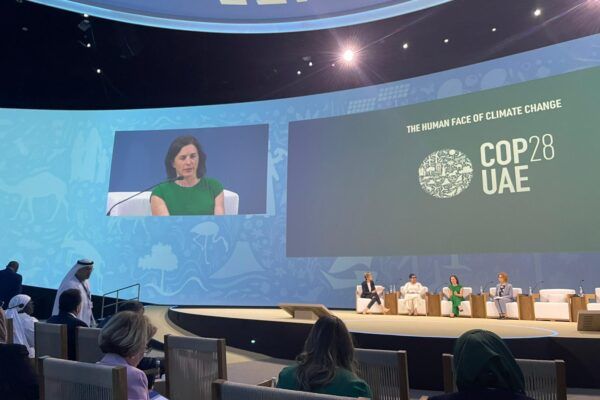For clean air advocates, COP28 has achieved an important step with the first mention of all fossil fuels in a COP outcome text in three decades of climate negotiations. Fossil fuels don’t just warm our climate – two thirds of outdoor air pollution comes from burning fossil fuels, profoundly impacting public health. Over 8 million people die every year from air pollution, and over 5 million of these deaths are attributed to fossil fuels.
A fair, fast and full phase out of fossil fuels
Governments will fail to keep warming within 1.5C without a full phase out of fossil fuels that is fair and fast. But today’s COP agreement is not just about temperatures, it’s also about saving lives from heart attacks, cancer, strokes, and asthma caused by pollution. This long overdue call for a transition away from fossil fuels does not go far or fast enough to address the global climate and health crisis.
References to transitional fuels such as fossil gas in the global stocktake are concerning. The world should instead be focusing on the promise of renewable energy and transitioning to these as soon as possible. An excessive focus on transition fuels will prolong poor health from pollution. Similarly, carbon capture and storage is not the solution – it perpetuates fossil fuel-related air pollution that costs lives. The answer is a rapid transition to renewable energy.
Most climate super pollutants ignored
Governments committed to substantially reducing non-carbon dioxide emissions by 2030. This is a small step forward on health-harming climate super pollutants, but only methane is explicitly mentioned. Black carbon and other super pollutants that are pushing the world to irreversible climate tipping points and climate extremes are conspicuously absent. Reducing black carbon emissions will have near immediate mitigation, resilience and health benefits.
Countries must act on the global stocktake to set and realise ambitious targets on black carbon emissions in their nationally determined contributions that are separate and additional to net zero commitments.
Health focus needs to turn into action on air pollution
COP28 has had a welcome focus on health, including the first ever health day and a declaration on climate and health now endorsed by 142 countries, and counting. The final outcome text on adaptation has a welcome new thematic target for health, calling for “Attaining resilience against climate change related health impacts, promoting climate-resilient health services, and significantly reducing climate-related morbidity and mortality, particularly in the most vulnerable communities”. As poor air quality directly inflicts disease and is both a cause and an effect of climate change, this puts significant new pressure on governments to act on air pollution to deliver across all of these commitments. Health must continue to be at the heart of future COP processes.
Funding must match the scale of the problem
COP28 might have delivered an agreement to move away from fossil fuels, but it has failed to deliver a plan to finance this phaseout. There urgently needs to be more finance to support this transition in the next decade, and this finance also needs to be ear-marked to simultaneously address air pollution too.
There was some good news on finance in the opening days of COP28, with the first funds pledged to the crucial loss and damage fund, which provides financial assistance to low-income countries. But the amounts pledged were a tiny fraction of what is needed: just $700 million was pledged compared to the $7 trillion spent on ongoing fossil fuel subsidies. However, there is some movement on that front as well, as the Global Stocktake calls on governments to phase out “inefficient fossil fuel subsidies that do not address energy poverty or just transitions, as soon as possible”.
Clean Air Fund’s annual State of Global Air Quality Funding report found this year that only 2% of international public climate finance addresses air quality, with just 5% of this funding reaching Africa and 1% Latin America and the Caribbean. There needs to be significantly increased financial support for initiatives to tackle air pollution, including through Official Development Assistance budgets and via multi-lateral development banks. It is essential that this funding targets underserved regions in Africa and Latin America and the Caribbean.
As leaders return home and the work for COP29 and beyond gets started, we need a stronger focus on the rapid implementation of ambitions to transition away from fossil fuels. We cannot address the climate crisis without an increased focus on health and air quality in national action plans and future climate negotiations. COP isn’t just about negotiating carbon emissions. It’s about negotiating fewer children suffering asthma attacks, preventing lung cancer cases and strokes, and creating a better quality of life for all of us.


